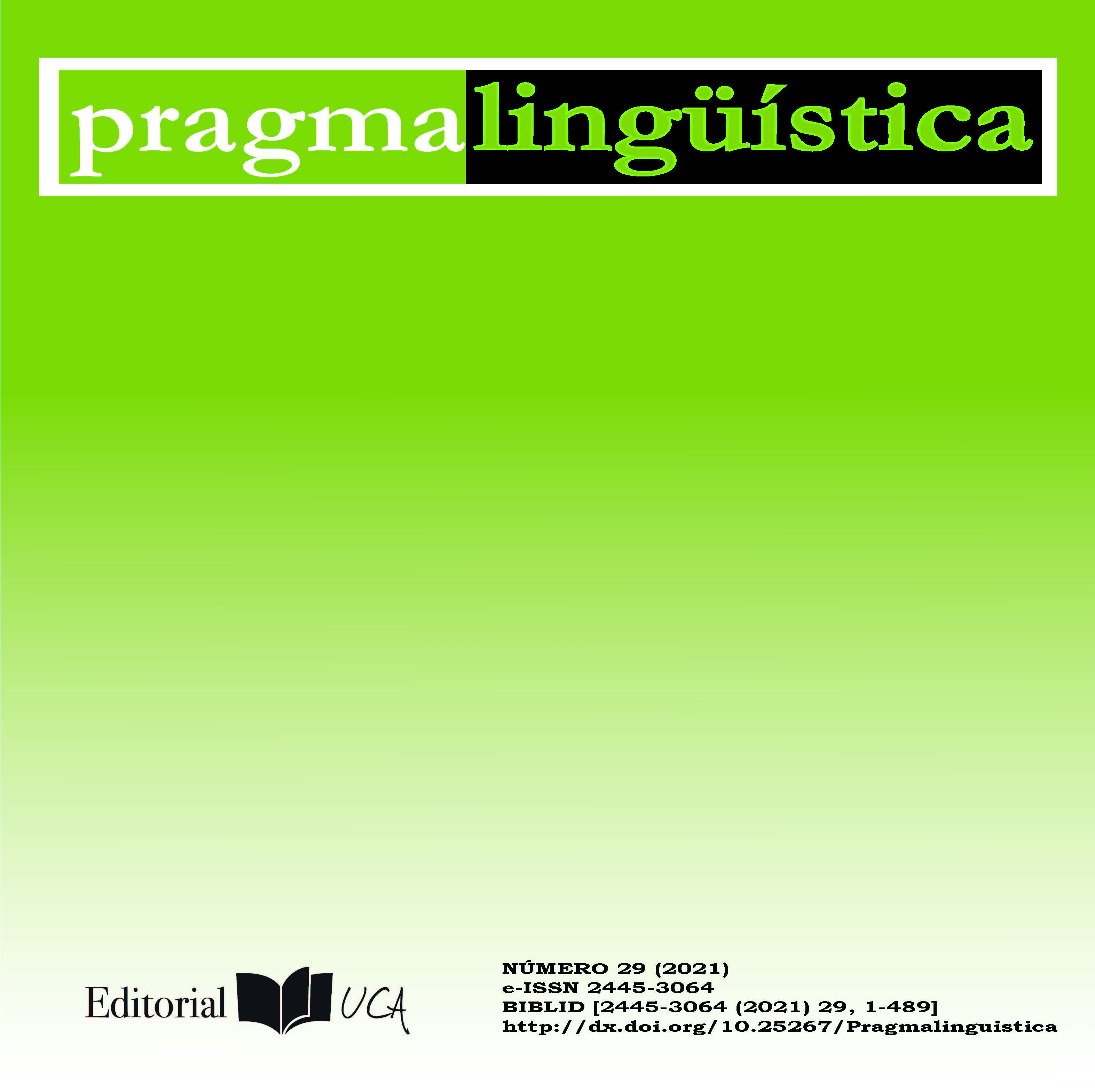Le développement de l'argumentation dans les textes d'histoire : modalité épistémique et évidentialité
Résumé
Le but de cet article est d'étudier l'utilisation de mécanismes épistémiques et probatoires pour indiquer l'opinion dans le cadre argumentatif de l'anglais moderne dans les textes d'histoire. Les données sont extraites du Corpus of History English Texts (CHET), compilé comme une sous-section du Coruña Corpus à l'Université de La Coruña (Espagne) (Moskowich et Crespo, 2007). Le corpus dispose de son propre outil d'analyse appelé Coruña Corpus Tool (CCT). Il n'y a pas de consensus sur la relation entre le mode épistémique et l’évidentialité. Dans ce document, notre approche est disjonctive (consulter Dendale et Tasmowski, 2001) en ce sens qu'elle est comprise comme une catégorie différente du mode épistémique, même s'il existe des cas de chevauchement fonctionnel. Les conclusions montrent que ces dispositifs ont un fort potentiel textuel et peuvent donc être utilisés pour le développement de l'argumentation.Mots-clés
Téléchargements
Comment citer
Licence
(c) Tous droits réservés Francisco Alonso Almeida, Francisco José Álvarez-Gil 2021

Ce travail est disponible sous licence Creative Commons Attribution - Pas d'Utilisation Commerciale - Pas de Modification 4.0 International.
Références
AIJMER, K. (2008): “At the Interface between Grammar and Discourse – a Corpus-Based Study of Some Pragmatic Markers”, Romero-Trillo, J. (ed.): Pragmatics and Corpus Linguistics: A Mutualistic Entente, Berlin: Walter de Gruyter, pp. 11-36.
AIKHENVALD, A. Y. (2006): Evidentiality, Oxford: Oxford University Press.
ALONSO-ALMEIDA, F. & CARRIÓ-PASTOR, M. L. (2017): “Variation and Function of Modals in Linguistics and Engineering Research Papers in English”, Marín-Arrese, J. I., Lavid-López, J., Carretero, M., Domínguez Romero, E., Martín de la Rosa, M.V. & Pérez Blanco, M. (eds.), Evidentiality and Modality in European Languages. Discourse-Pragmatic Perspectives, Bern: Peter Lang, pp. 277-311.
ÁLVAREZ-GIL, F. J. (2018): Adverbs ending in -Ly in Late Modern English. Evidence from the Coruña Corpus of History English Texts, Valencia: Editorial Universitat Politècnica de València.
AUWERA, J. VAN DER & PLUNGIAN, V. A. (1998): “Modality’s Semantic Map”, Linguistic Typology, 2(1), pp. 79-124. https://doi.org/10.1515/lity.1998.2.1.79.
BIBER, D., JOHANSSON, S. LEECH, G., CONRAD, S. & FINEGAN, E. (1999): Longman Grammar of Spoken and Written English, Harlow: Longman.
BOYE, K. & HARDER, P. (2009): “Evidentiality: Linguistic Categories and Grammaticalization”, Functions of Language, 16(1), pp. 9-43. https://doi.org/10.1075/fol.16.1.03boy.
BYBEE, J. L., PERKINS, R. & PAGLIUCA, W. (1994): The Evolution of Grammar: Tense, Aspect and Modality in the Languages of the World, Chicago: The University of Chicago Press.
CHAFE, W. (1986): “No Evidentiality in English Conversation and Academic Writing”, Wallace, C. & Nichols, J. (eds.), Evidentiality: The Linguistic Coding of Epistemology, Norwood: Ablex, pp. 261-272.
COLLINS, P. (2009): Modals and Quasi-Modals in English, Amsterdam: Rodopi.
CORNILLIE, B. (2009): “Evidentiality and Epistemic Modality: On the Close Relationship between Two Different Categories”, Functions of Language, 16(1), pp. 4-62. https://doi.org/10.1075/fol.16.1.04cor.
CORNILLIE, B. & DELBECQUE, N. (2008): “Speaker Commitment: Back to the Speaker. Evidence from Spanish Alternations”, Belgian Journal of Linguistics, 22, pp. 37-62.
CUTTING, J. (2007): Vague Language Explored, London: Palgrave Macmillan. https://doi.org/10.105/9780230627420.
DENDALE, P. & TASMOWSKI, L. (2001): “Introduction: Evidentiality and Related Notions”, Journal of Pragmatics, 33(3), pp. 339-348. https://doi.org/10.1016/S0378-2166(00)00005-9.
EGGINS, S. (1994): An Introduction to Systemic Functional Linguistics, London: Pinter.
FINEGAN, E. (1995). “Subjectivity and Subjectivisation: An Introduction”, Stein D., & Wright, S. (Eds.): Subjectivity and Subjectivisation, Cambridge: Cambridge University Press, pp. 1-15. http://dx.doi.org/10.1017/CBO9780511554469.001.
HALLIDAY, M.A.K., & MATTHIESSEN, C.M.I.M. (2013). Halliday's Introduction to Functional Grammar (4th ed.), London: Routledge. https://doi.org/10.4324/9780203431269
HOYE, L. (1997): Adverbs and Modality in English, Essex: Longman.
HUDDLESTON R. & PULLUM G. (2002): The Cambridge Grammar of the English Language, Cambridge: Cambridge University Press.
HYLAND, K. (2005): Metadiscourse: Exploring Interaction in Writing, London: Continuum.
MOSKOWICH, I. (2017): “Genre and change in the Corpus of History of English Texts”, Nordic Journal of English Studies, 16 (3), pp. 84-106.
MOSKOWICH, I. (2011): “'The Golden Rule of Divine Philosophy' Exemplified in the Coruña Corpus of English Scientific Writing”, Lenguas para Fines Específicos, 17, pp. 167-198.
MUSHIN, I. (2000): “Evidentiality and Deixis in Narrative Retelling”, Journal of Pragmatics, 32(7), pp. 927-57. https://doi.org/10.1016/S0378-2166(99)00085-5.
NUYTS, J. (2001): “Subjectivity as an Evidential Dimension in Epistemic Modal Expressions”, Journal of Pragmatics, 33(3), pp. 383-400. https://doi.org/10.1016/S0378-2166(00)00009-6.
PALMER, F. R. (1986): Mood and Modality. Cambridge Textbooks in Linguistics, Cambridge: Cambridge University Press.
PALMER, F. (2001): Mood and Modality (2nd ed.), Cambridge: Cambridge University Press.
PLUNGIAN, V. A. (2001): “The Place of Evidentiality within the Universal Grammatical Space”, Journal of Pragmatics, 33 (3), pp. 349-357. https://doi.org/10.1016/S0378-2166(00)00006-0.
ROORYCK, J. (2001): “Evidentiality, Part I”, Glot International, 5, pp. 125-133.
WILLETT, T. (1988): “A Cross-Linguistic Survey of the Grammaticization of Evidentiality”, Studies in Language, 12(1), pp. 51-97. https://doi.org/10.1075/sl.12.1.04wil.







